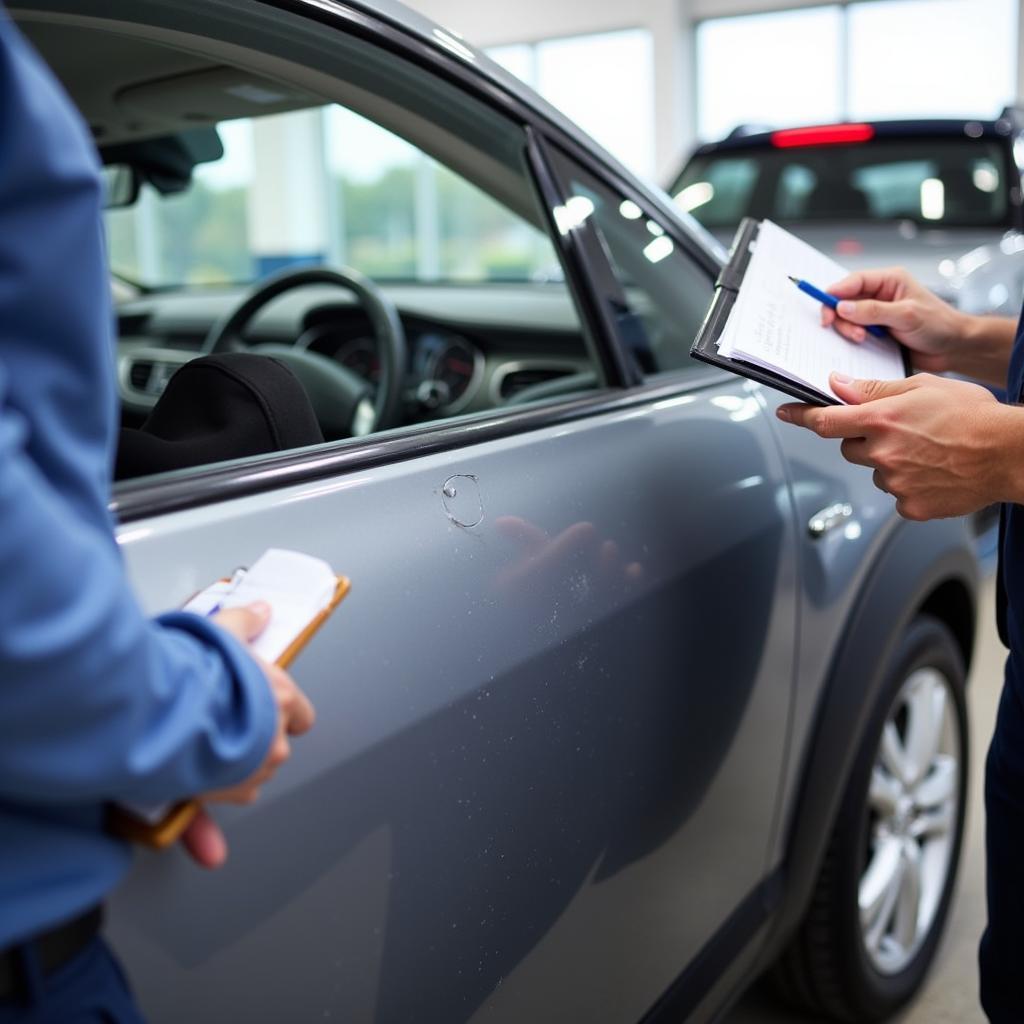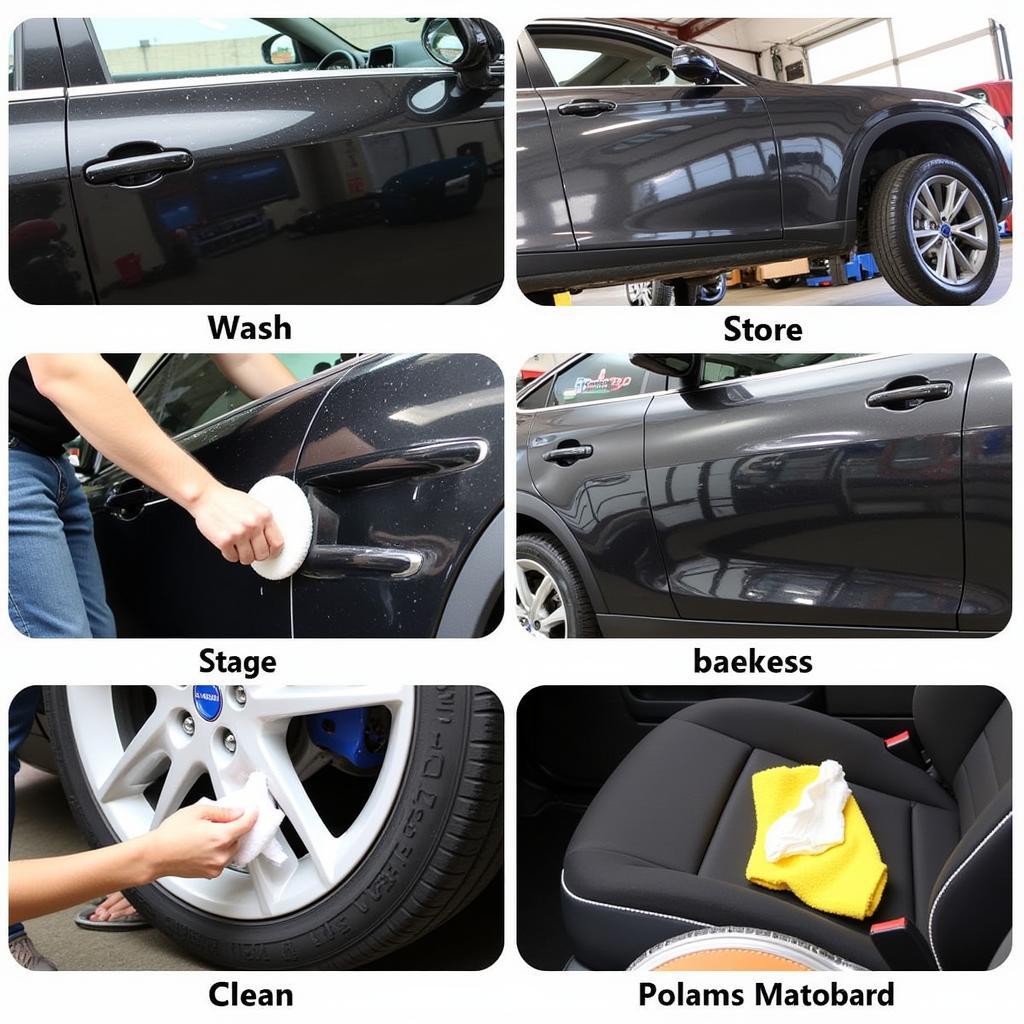Returning a leased car can feel like navigating a minefield of charges. You’re likely wondering, should I detail my car before returning a lease? This comprehensive guide will explore the pros and cons of detailing your leased vehicle before turning it in, helping you make the most informed decision.
Detailing your car can make it look fantastic, but is it financially worthwhile when returning a leased vehicle? Often, dealerships are more concerned with excess wear and tear than minor imperfections easily remedied with a basic car wash. Let’s delve deeper into this important question. You might be surprised by what you learn. See our guide on how dealers detail cars for further insight.
Understanding Lease-End Inspections
Lease-end inspections are designed to assess the condition of your vehicle and identify any damage beyond normal wear and tear. This “normal wear and tear” is usually defined in your lease agreement. Inspectors focus on significant damage like dents, scratches, and mechanical issues. While a sparkling clean car is always pleasant, it won’t necessarily impact the assessment of significant damage that could incur charges. You should consider whether to detail your car before trading it in as well.
What to Expect During the Inspection
The inspector will meticulously document the car’s condition, noting any damage that exceeds the acceptable wear and tear guidelines. This report forms the basis for any charges you might face. Minor imperfections like swirl marks or light interior staining are generally overlooked. Focus your efforts on addressing noticeable damage that could result in fees.
 Lease Return Inspection Process
Lease Return Inspection Process
Weighing the Pros and Cons of Detailing
While a detailed car looks its best, it’s essential to consider the cost-benefit aspect when returning a leased vehicle. Will the expense of detailing translate into avoiding charges?
Pros of Detailing
- Improved First Impression: A clean car makes a positive impression, potentially influencing the inspector’s overall perception (although this is unlikely to affect objective assessments of damage).
- Easier to Spot Damage: A clean car allows you to identify and address any minor damage before the inspection, potentially minimizing charges.
Cons of Detailing
- Cost: Professional detailing can be expensive, potentially outweighing any avoided charges for minor wear and tear.
- Time Investment: Detailing takes time, which you could spend on other essential tasks related to the lease return process. Check out this guide on the cost of detailing a leased car.
 Professional Car Detailing Process
Professional Car Detailing Process
Is Detailing Worth the Cost?
“In most cases, a thorough cleaning is sufficient for a lease return,” says automotive expert, John Smith, Senior Automotive Appraiser at Nationwide Auto Assessments. “Dealerships are trained to look past superficial imperfections and focus on actual damage.”
So, should you get your car detailed before turning in a lease? Probably not. A basic wash and vacuum is usually enough. This approach saves you money and time while still presenting a respectable vehicle. You can also see our guide for getting your car detailed before turning in a lease.
Focusing on Repairs, Not Cosmetics
Instead of investing in detailing, prioritize addressing any actual damage that exceeds the acceptable wear and tear guidelines. Repairing dents, scratches, or damaged upholstery is more likely to reduce your lease-end charges.
“Focus your resources on repairing actual damage, not masking minor imperfections,” advises Sarah Jones, Certified Lease Return Specialist at LeaseWise Solutions. “This is where you’ll see the most return on your investment.”
Conclusion
While a beautifully detailed car is visually appealing, it’s often unnecessary when returning a leased vehicle. A thorough cleaning, combined with addressing any significant damage, is generally sufficient. Should I detail my car before returning a lease? The answer is typically no. Focus on repairs and save your money for your next vehicle.
FAQ
- What is considered normal wear and tear on a leased car? Normal wear and tear refers to minor imperfections expected with regular use, as outlined in your lease agreement.
- What happens if I return a leased car with excessive damage? You may be charged for repairs exceeding normal wear and tear.
- Can I detail my leased car myself? Yes, you can detail your car yourself to save money.
- Should I repair damage before returning my leased car? Yes, repairing damage is often more cost-effective than incurring charges from the dealership.
- What should I do before returning my leased car? Review your lease agreement, clean the car, and address any significant damage.
Don’t hesitate to reach out! For 24/7 support, contact us via WhatsApp: +1(641)206-8880 or email us at [email protected]. Our team is always here to assist you.

Leave a Reply